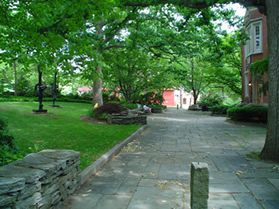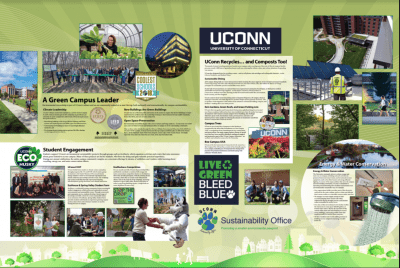The Office of Sustainability (OS) is under the umbrella of the Provost’s Office (Vice Provost for Academic Operations) within the Institute of the Environment (IoE), with a secondary reporting relationship on operational matters to the Executive Vice President for Administration & Chief Financial Officer (EVPA & CFO). The OS works with senior administrators, students, faculty and staff to set and achieve strategic sustainability goals in the areas of climate action and resilience, energy and buildings, waste reduction and diversion, water resources, food and dining, grounds, purchasing, transportation, open space and natural resource stewardship, and the intersection of these issues with environmental and social justice. We develop outreach and engagement programs that feature experiential learning to raise awareness and improve performance around sustainable practices and behaviors.
As a consequence, UConn is internationally recognized as a leader in campus sustainability, consistently placing in the top 10 of the Sierra Club's Cool Schools ranking and possessing a Platinum Rating with the Association for the Advancement of Sustainability in Higher Education's Sustainability Tracking, Assessment & Rating System (STARS). By convening and leading the Environmental Policy Advisory Council (EPAC), and more recently through its participation on President’s Working Group on Sustainability & the Environment, the OS provides the University community with a focal point for dialogue on energy and environmental issues, and has been integral to the successful planning and implementation of environmental sustainability initiatives at UConn.
The OS hosts a number of outreach and engagement events and activities throughout the school year including Green Game Day, Earth Day Spring Fling, and EcoMadness. It also coordinates the UConn@COP program, building future leaders in climate science and policy by sending students and faculty members to the UN summit on climate change Conference of the Parties (COP).
History
 In September, 2002, the University of Connecticut created the position of Director of Environmental Policy in order to focus on certain environmental issues and opportunities. The University has provided this Director with the authority to pursue environmental excellence in the areas of regulatory compliance, green building, and sustainability.
In September, 2002, the University of Connecticut created the position of Director of Environmental Policy in order to focus on certain environmental issues and opportunities. The University has provided this Director with the authority to pursue environmental excellence in the areas of regulatory compliance, green building, and sustainability.
The Director's first steps were to manage the University's response to various DEEP enforcement actions and concerns about the capital improvements program - having direct authority over construction-related permits and Environmental Impact Evaluations (EIEs) required for large building projects. He also led a consensus-building process with key stakeholders, including state legislators and town residents, to revise UConn's Master Plan for the conservation and development of its 886-acre Agricultural Campus.
Along with these tasks and review, the Director took steps to form the Environmental Policy Advisory Council (EPAC) to the President. This 25-member senior advisory group would become a vehicle to engage UConn students, faculty, administrators, and staff in a dialogue about environmental stewardship, sustainability and leadership across the university.
In 2019, the Office of Environmental Policy (OEP) was reorganized into the Office of Sustainability (OS) and joined the newly formed Institute of the Environment (IoE) along with the Center for Environmental Sciences & Engineering, Connecticut State Museum of Natural History, and the Natural Resources Conservation Academy.
Lessons Learned
The development and growth of this position has led to many lessons on the potential successes in sustainability possible at a University campus, including:
- A senior level staff position reflects the University's commitment and sends a strong message to the campus community that environmental sustainability and compliance are core values of the institution
- A broad, multi-disciplinary organizational framework, such as UConn's environmental council, is necessary to achieve buy-in, develop consensus, and communicate with the broader community
- Student interns provide essential research and technical support services, particularly in the absence of full-time staff. Teamwork, and shared expertise and knowledge about how the university works are vital to the success of campus "greening" initiatives
- The campus setting, with its decentralized and diverse academic and staff departments, calls for a more flexible, consensus building and project approach to environmental management.
- Expect organizational change: Since the Director's appointment, UConn administration has been reorganized to separate the operational functions from the academic functions.
- Progress and change often occur slowly; not just because of the size and complexity of the university, but also the need to build environmental awareness, discuss issues, reach consensus, and implement programs that may be perceived as above and beyond the core functions (i.e. education and research).
